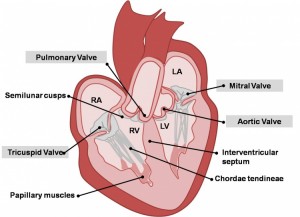News
Archive for March, 2018
What is a Heart Murmur?
by admin on March 1st, 2018
Category: News, Tags:
Hearing your vet announce that “your pet has a heart murmur” can be very daunting. However, the significance of a murmur very much depends upon the situation. Just as a fever can be something or nothing, a murmur may be similar – it may be insignificant, but it could also be a symptom of a disease that requires treatment. So, first of all, what is a heart murmur?
Simply put, a murmur is a sound produced by a squirt of blood inside the heart when it pumps. There are many causes of a murmur.
There are three sections in this information sheet:
- Murmurs explained
- FAQs about murmurs
- List of the common causes of murmurs in dogs and cats
1. Murmurs explained
Murmurs due to regurgitation
Each of the four valves in the heart act as non-return valves, permitting blood flow in one direction (forwards). If a valve becomes faulty and no longer prevents backflow, then there is a resultant backward squirt of blood through the gaps in the valve with each heartbeat. This backward squirt of flow through an incompetent valve results in an abnormal heart sound called a heart murmur. A murmur thus sounds like a ‘squirting’ or ‘gushing’ sound during each heartbeat. The most common cause of an incompetent valve in older dogs is Mitral Valve Disease, or Endocardiosis, as it is also known.
Murmurs due to narrowed valves
If a heart valve is abnormally narrowed, usually due to a congenital defect (eg. Aortic Stenosis or Pulmonic Stenosis) then blood flow pumped out through the narrowed valve is pinched, resulting in an abnormal squirt of flow, ie. a murmur. This can be likened to putting a thumb over the end of a hose pipe to make the water squirt, rather than pour.
Murmurs due to ‘holes in the heart’
A murmur can also occur through a hole in the heart – the murmur is caused by the squirt of blood going through the hole. A hole between the left ventricle and right ventricle results in a squirt of blood being pushed through the hole when the heart ventricles pump (this is called a Ventricular Septal Defect (VSD)). A hole between the aorta and pulmonary artery (the two major arteries leaving the heart) results in blood squirting through the hole (this is called a Patent Ductus Arteriosus (PDA)).
Puppy murmurs
In puppies less than 6 months of age, in addition to murmurs produced by congenital defects, puppies can have innocent or benign murmurs – often called a puppy murmur. These occur due the fast flow of blood in such a small heart. As the puppy and its heart grow and mature, then the murmur gradually disappears. It is virtually impossible for a vet to discern the difference between a puppy murmur and a congenital defect. If a murmur persists beyond 6 months of age, it is more likely to be a congenital defect.
Murmurs associated with illness
A murmur can also be produced when a dog is anaemic and the blood thin. In this situation, thinner blood (less viscous) results in a faster speed of flow and thus a murmur. A similar situation can occur when a dog is ill for other reasons, such as during a fever.
2. FAQs about heart murmurs in cats and dogs
What is the significance of a murmur?
This depends upon what the cause of the murmur is from the list above, whether the defect causing the murmur is classified as: mild, moderate or severe, and whether it is resulting in heart enlargement or not.
Is the loudness of a murmur significant?
Not always. It depends upon what the cause of the murmur is from the list above. Some murmurs are innocent and of no clinical significance, whereas others are associated with defects. Many defects can be mild and have no effect on the heart and animals can live a full and normal life with them, whereas other defects affect the heart and may need some form of treatment.
Do all these murmurs sound different for each defect?
No, in fact they virtually all sound the same. The squirt (murmur) is heard when the heart beats, so the murmur is brief. The only defect that produces a slightly different sound is a PDA – the murmur is continuous rather than intermittent or brief.
Listening with a stethoscope is not easy and many vets find this difficult. As humans, we all have differing skills and abilities, so there is a lot of variation. It is likely that a veterinary cardiologist will hear murmurs better, because they have had a lot more practice and experience, as well as additional training.
What is the best way to diagnose a murmur?
Nearly always, an ultrasound scan (echocardiography) is the best way to diagnose a murmur. But sometimes additional tests are also required, such as chest x-rays, ECG or blood tests. Echocardiography is a difficult and skilled examination that is best performed by an experienced clinician.
3. List of the common causes of murmurs in dogs and cats
Defects can be congenital, meaning an animal has been born with the defect. Or there can be changes in the heart that develop in adult life, for example due to ageing degeneration of a valve.
Murmur due to Mitral Valve Regurgitation:
- Mitral Valve Disease (MVD) is the most common cause of a murmur in adult dogs in older age
- Mitral Valve Dysplasia is a congenital defect of the valve
- Mitral Valve Regurgitation can occur secondary to heart enlargement of other causes in dogs
- Mitral Valve Regurgitation can be secondary to cardiomyopathy in cats
Murmur due to Aortic Valve Stenosis:
- Subaortic Stenosis and Valvular Aortic Stenosis is a congenital defect of the valve
- Hypertrophic Cardiomyopathy in cats, often causes ‘Subaortic- like Stenosis’
Murmur due to Tricuspid Valve Regurgitation:
- Tricuspid Valve Disease occurs in adult dogs in older age, most will also have MVD
- Tricuspid Valve Dysplasia is a congenital defect of the valve
- Tricuspid Valve Regurgitation can occur secondary to Pulmonary Hypertension
- Tricuspid Valve Regurgitation can be secondary to heart enlargement of other causes
- Tricuspid Valve Regurgitation, when mild, can be seen in some normal dogs
Murmur due to Pulmonic Valve Stenosis:
- Valvular Pulmonic Stenosis is a congenital defect of the valve
Murmurs associated with holes in the heart:
- Patent Ductus Arteriosus is a congenital defect resulting in abnormal flow between the aorta and pulmonary artery
- Ventricular Septal Defect is a congenital defect in which there is a hole between the two ventricles
Innocent murmurs
These are murmurs due to abnormal flow within the heart and not due to a defect in the heart, ie. there is no congenital defect or degenerative disease. There are a number of causes, these are just some examples:
- Puppy murmurs are innocent murmurs that usually disappear by 4-6 months of age
- Anaemic murmurs are due to the blood being thin
- Fever murmurs are due to turbulence in blood flow
- Flow murmurs are seen in some athletically fit dogs, ie. a murmur with no defect present
Special Offer – March – Wellness Screen Offer
by admin on March 1st, 2018
Category: Special Offers, Tags:
Pet of the month – March – Poppy
by admin on March 1st, 2018
Category: Pet of the Month, Tags:
 Meet our wonderful slimmer, Poppy. She started Sienna’s weight clinic at a whopping 17kg and now weighs 12.7kg. Her overall weight loss is absolutely enormous! Poppy and her owners have done so well to achieve her target weight!
Meet our wonderful slimmer, Poppy. She started Sienna’s weight clinic at a whopping 17kg and now weighs 12.7kg. Her overall weight loss is absolutely enormous! Poppy and her owners have done so well to achieve her target weight!
Her quality of life has improved dramatically. She attends hydrotherapy once a week for her hip problems and now swims with jets on because she’s too good!
Congratulations Poppy!!
Canine obesity is in fact the most common nutritional disorder seen in dogs. As with humans, it’s caused by an imbalance of taking in more energy than giving out. This can give rise to a persistent and potentially life threatening energy surplus.
How to know if your dog is overweight
Signs of canine obesity include owners struggling to see or feel their dog’s ribs, spine or waistline; abdominal sagging; a bigger, rounder face; a reluctance to go for walks or lagging behind; excessive panting; and the dog appearing tired and lazy. Grossly overweight dogs may even need assistance getting up and down, in and out of vehicles, and often refuse to move or play games.
Problems associated with obesity
Vets see these problems all too often, with obese pets posing greater risks from anaesthetic and surgical complications, heat or exercise intolerance, complications from cardio-respiratory disorders, hormone problems, skin disease, cancer, urogenital disorders, even early death. Canine obesity may even contribute to tracheal collapse and laryngeal paralysis too.
Common canine problems suffered as a result of obesity include diabetes (where the pancreas fails to secrete enough insulin in order to regulate blood glucose levels); heart disease (caused by high cholesterol levels); as well as arthritis directly affecting mobility, making it even harder for your pet to lose weight.
Until fairly recently, fatty tissue was thought to be just a relatively lifeless energy store and insulator; but we now know it secretes hormones affecting appetite, inflammation, insulin sensitivity and bodily function, as well as influencing water balance and blood pressure leading to kidney disease and high blood pressure.
Ways to prevent obesity
If your dog is overweight then carefully start changing his feeding habits; increasing exercise (e.g. more or longer walks, or take up a canine activity such as agility or flyball); looking at the type of food and his intake; creating a feeding plan.
One of the very best ways is to make regular visits to your vet nurse for weight loss advice and to have free weight checks and record your success.
Come and join our weight clinics today! There is a small £5 joining fee after which you and your pet receive a weight management booklet with tips on keeping your pet at a healthy weight, body condition score chart, measuring cup, calorie chart of common treats, food diary and leaflets on foods available to help your pet lose weight.
This is followed by regular free of charge check-up appointments to ensure your pet reaches his/her optimal weight.
Phone today to book an appointment with our weight management nurse Sienna!



